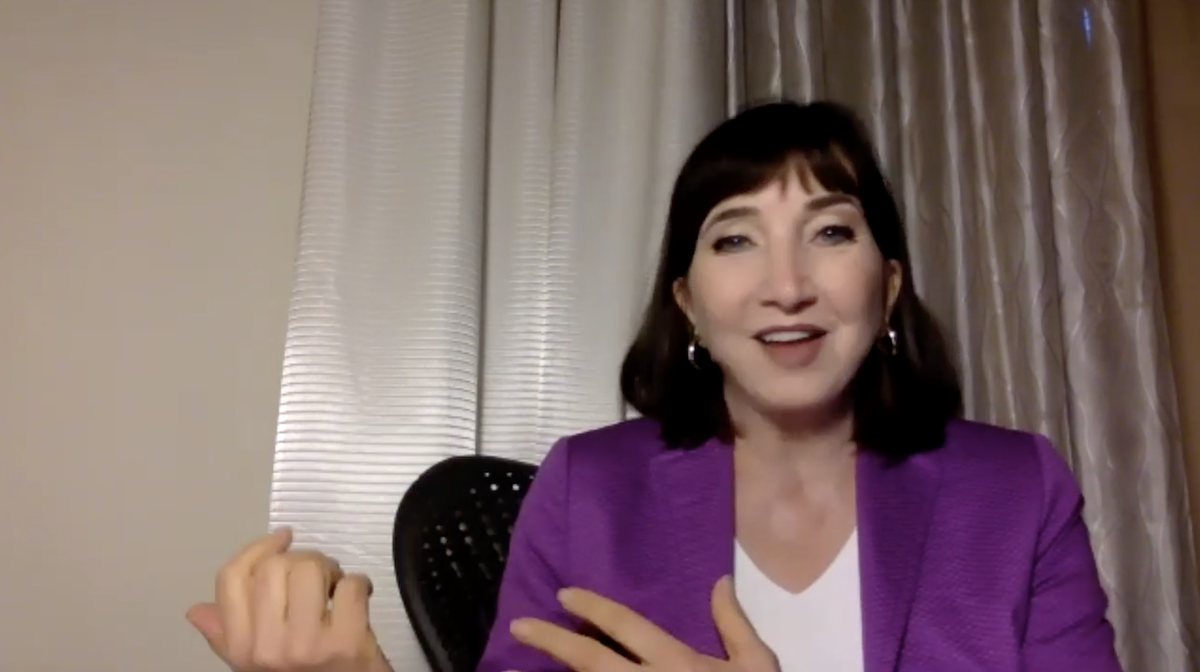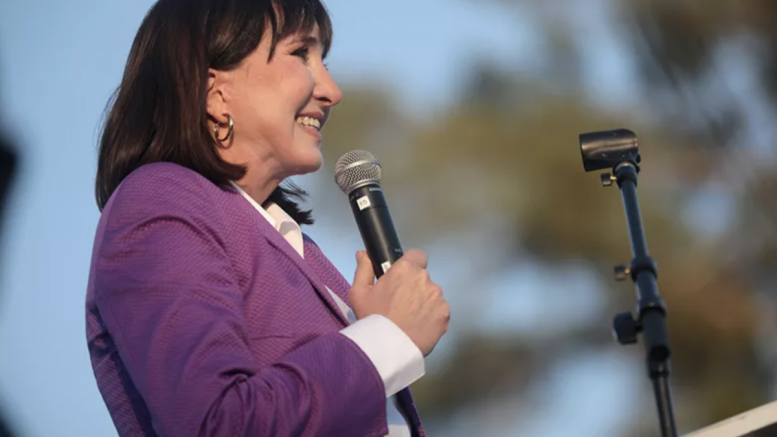Dr. Jo Jorgensen is the third most popular candidate in the 2020 U.S. election, following Joe Biden and Donald Trump.
As part of the 2020 U.S. presidential election, Republican candidate Donald Trump and Democratic candidate Joe Biden regularly frequent mass media headlines across the world.
Less portrayed, however – for now – is Dr. Jo Jorgensen, the third most-popular presidential candidate, who also happens to be ancestrally Scandinavian.
Jo Jorgensen: Quick facts
Dr. Jorgensen’s grandparents immigrated to the United States from Denmark and Sweden.
Dr. Jorgensen is this year’s candidate, and decades-long passionate member, of the Libertarian Party.
Libertarian political philosophies support social liberties, quite like the Scandinavian countries. But, Libertarians also advocate for small government and free markets – the polar opposite of the Scandinavian system Dr. Jorgensen’s grandparents came from.
Dr. Jorgensen is the only female presidential candidate left in the running this year.
Dr. Jorgensen was born on May 1, 1957, in the state of Illinois’ city of Libertyville.
Dr. Jorgensen holds a PhD in Psychology from Clemson University, where she has been a Senior Lecturer since 2006.
Dr. Jorgensen is a mother and grandmother.
Read on to learn about Dr. Jorgensen’s life, the influence her Scandinavian immigrant grandparents had on her, and her views on libertarianism, a political system far from that of the famous Nordic model.
Libertarian philosophy 101
Could you give our readers an intro to libertarianism?
“What I tell people is that the libertarian party is on your side, and not the side of the special interests and bureaucrats and politicians in Washington. I tell people that you know better than any bureaucrat how to spend your money and that you know better what your family needs.
“The way the old parties [the Democratic Party and Republican Party] work is they want us all to get together and vote on doing it one way, having one way of doing things, whereas libertarians say you should be able to keep your resources and you should be able to live your life how you want to and make your own decisions,” Dr. Jorgensen says.
“A huge influence”: Dr. Jo Jorgensen on her grandparents
Your grandparents immigrated to America from Scandinavia, is that right?
“Yes! My grandmother and grandfather from one side are from Denmark and then my grandfather from the other side is from Sweden.”
Were your grandparents an influence on your life? You mention them in some of your speeches.
“Oh, a huge influence.
“They saw what it was like to not really be able to make your own choices. My grandmother used to just tell me how great it was that in America, you can start your own business, and you can work two or three extra jobs, and keep the extra money.
“My grandfather started a cement contracting business, making things such as sidewalks and garages.
“You know, my grandparents weren’t rich. In fact, when they retired, they retired to what I call ‘the trailer park’, to a trailer,” Dr. Jorgensen laughs.
She continues, “My grandmother would always correct me and say ‘It’s a mobile home!’
“It’s not that they were rich, but it was just the idea that they could work for themselves and make their own decisions. They could work as hard or as little as they want, and keep what they made.”
Do you think their “American Dream” is possible in 2020?
“Well, no, I don’t.
“There are all sorts of rules and regulations that keep you from starting your business. There are zoning laws.
“People who are poor, or don’t have an education, have a hard time starting a business out of their home because they have to go hire lawyers and look at zoning laws and all of that. If we look at some specific situations and culture-specific things; people of color who, for instance, braid hair. Oftentimes, they’re made to spend thousands of dollars on training to get them up to a certain level of certification.
“And the training sometimes doesn’t even involve what it is they’re doing.
“For instance, there was a case in Texas in which a woman was from the Far East and she was threading eyebrows. She had to take a complete course in order to get certified, but they didn’t even teach what she did. In fact, they didn’t even know how to do it!
“So, it’s just adding bureaucratic red tape for people who want to go into business for themselves.”
Your thoughts on immigration, as a granddaughter of immigrants?
“You probably know where I stand on that,” Dr. Jorgensen laughs.
“Even if I weren’t the granddaughter of immigrants, I still say immigration is what made our country so successful.
“My grandparents immigrated before they closed the borders in the 1920s. A lot of people don’t realize that the borders were open before the 1920s and things were fine.
“People maybe don’t always assimilate in the first generation but by the second generation, they’re almost fully assimilated – and sometimes much to the chagrin of their parents.
“GDP-wise, too, immigrants help GDP. Crime-wise, people who are born on foreign soil actually commit fewer crimes in this country than people born on American soil.
“So, I say we need immigrants, not just to help them out, not just to help refugees, but to make our country greater.”
Comparing the Libertarian and the Scandinavian
It’s interesting that on many of the world happiness indexes and rankings, it’s always the Scandinavian countries, which are known for their big governments and welfare models, that are first.
“I’m excited to talk about this because I actually teach a happiness class. Every summer I teach ‘Pursuing Happiness’.
“I saw an interview on a US news show, and they were interviewing people from Denmark. This one guy said ‘Well the reason we’re happy is we don’t expect things to go well. Like if the bus is on time, we’re elated because the bus was on time.’
“Whereas Americans, their expectations are so different. Americans just expect the bus to be on time. In fact, I would say it goes even worse than that. We expect the bus to be there early if we’re early, and we expect it to be late if we’re running late. You know, we just expect things to work out around us.
“When you’re talking about happiness, there’s objective happiness and then there’s subjective happiness. Because you can think that you’re happier than you are. Or you can think that you’re less happy.
“In fact, that’s exactly what the data shows, that something like 80% of people says that they’re happier than the average person. Well obviously, only 50% can be happier than the average person. So, it all has to do with subjective things.”
In terms of healthcare, there are also all these indexes in which Norway, Denmark, and Sweden rank at the top. One of the indicators is often how much governments spend on healthcare per head. How could a system where that isn’t one of the criteria even be ranked?
“What I’ve been telling voters is if you look at the only two somewhat free market healthcare systems or healthcare fields in the US, they’ve been going down in price.
“For, instance LASIK eye surgery. If you look from around the early 90s to around 2012, prices dropped 70%-75%.
“Because people paid for that with their own money, the different clinics had to compete.
“So, while the prices are going down 70% in that field, general healthcare costs are going up 125%, because with general healthcare you’re not paying the price. You couldn’t even comparison price shop if you wanted to.
“Around 15 years ago I didn’t have insurance for a while, and had to have an MRI or CAT scan, so I called a few places to find out how much it costs. Nobody could tell me.
“They said, ‘We have to ask your insurance company’. I said, ‘Well I don’t have insurance’. ‘We can’t tell you’.
“I mean imagine having to buy a car like that or a computer and being told ‘We can’t tell you the price’.
“I have a car analogy, which I think is the very best analogy. What if car insurance paid not only for unexpected costs but all the little expected costs like it does in healthcare; our checkups, bloodwork, all the little stuff? Imagine if your car insurance paid for gas, oil, and car washes.
“You would have absolutely no reason to shop around for the best gas prices, in fact, you might even go to the nicest gas station because they give you free coffee while you wait. You whip out your little USD 5 copay card, and what does it matter if it’s the nicest gas station or a cheap gas station?
“Therefore, the gas stations would have absolutely no reason to compete on price. They would simply raise the prices to the car insurance companies, and then the car insurance companies would raise the car insurance premiums the following year.
“That’s what we’ve got with healthcare. We’ve got prices spiraling up because there’s nobody cutting costs. That’s what happens when you spend other people’s money.
“If we look at a system that’s working fairly well, which is in Singapore, their costs are 1/3 of ours, and the people like their system. When they shop around for the best prices, if they find a better price, they get to keep the savings. And that’s the way it should be.”
If you look at representative photos of parties in Scandinavian parliaments, they’re definitely more rainbow colored, that is, inclusive of more parties than America’s Congress, which is basically a blue-red duopoly.
“I would say that that’s one thing that Scandinavia does a whole lot better than America.
“Because, yes, the Democrats and Republicans know they hold the monopoly, and they’re not going to give it up.
“In fact, you’ve probably heard that I was kept out of the debates.
“They do everything they can to keep an alternative party from showing their ideas because they know that when people hear our ideas that they’re going to like them.”

How would you propose to change that, and make the American system more rainbow-like?
“We’re doing everything we can.
“We’re trying to bypass the mainstream media and go to social media.
“It has been working in that something like 75% of our volunteers are from outside of the party. So, a lot of people are saying ‘Wow I just don’t like what’s there, and I’m glad that we’ve got an alternative here.’
“We’re just doing the best we can.
“Right now we’ve got somebody in headquarters who is trying to arrange an outside debate and we’ll see how that goes. We’re having some prominent people who are going to write op-ed pieces to try to get the word out there like ‘Hey, here’s Jo by herself on the debate stage, where are the other two, what are they afraid of?’
“The Libertarian Party, I’m so excited, did hire somebody who was formerly working for the Democratic Party. Somebody who, instead of just believing in our philosophy, also understands the ropes of how the other two guys work. So, we’re hoping to get somewhere with that.”
It sounds like you’re working on educating the U.S. public that there are other options.
“Yes. Well, part of our problem is that the Libertarian Party early on did focus a lot on education and not politics, because basically people needed educating on how the system works.
“When the party first came about [in the 1970s], we didn’t have a lot of these outside people, we didn’t have a lot of these research tanks.
“So, in fact, when the Libertarian Party first formed, people were saying ‘Well maybe we don’t even want to run candidates’. That’s kind of silly to have a political party where you’re not even running candidates.
“After that, we’ve gotten publications like Reason Magazine, and all these think tanks out there that are educating the people. So now, we can focus on what we should be focusing on, which is politics.
“But here’s part of the problem of trying to make a dent.
“It’s really easy for the Democrats and Republicans to say, ‘Oh sure, I can solve your problems, we’ll just give you money. You’re out of a job, we’ll just give you money’.
“The Libertarian Party has to explain that the government is giving you that money if you’re unemployed, but that money has to come from somewhere. And it’s coming from businesses. How about let it stay in the businesses and then they could hire you directly?
“So, there’s just a couple more steps that we have to go through.”
Do you include any of your teaching philosophies in your candidacy?
“Well, I try not to”, Dr. Jorgensen laughs.
“When I get rated by my students, they usually rate me as being very easy to understand. I’ve had students say ‘I took this class from somebody else and it didn’t make sense, but you talk in plain English’.
“So, I try to talk to voters about what’s important for them in everyday language instead of trying to get too philosophical.
“In the beginning, the Libertarian roots were very philosophical, but we’ve got to get out there and explain to people, ‘Ok, healthcare costs are going through the roof, we’ve got to go something about it’. Healthcare is life or death.
“We are in 160 countries around the world, we have got to stop this. We spend more on the military than the next seven countries combined. We’ve got to end this.
“I think these are ideas that the American public is just waiting for, especially since the Democrats and Republicans don’t really talk about issues. They never want to answer a question about why they haven’t done anything right.
“Of course, their tactics right now are, ‘You don’t want to hire the other guy, you should be afraid of the other guy’. Right now, everything is fear. ‘I’m voting for Biden because I don’t want Trump to have another term in office’ or ‘I’m voting for Trump because you can’t let Biden get in there with his socialism’. It’s all fear-based.”
Dr. Jo Jorgensen’s examples of applied Libertarianism
Can the proposed internal accountability of a free market be applied to climate change and the environment?
“Absolutely.
“First of all, look at the globe. Wherever there’s less government, there’s less pollution. Wherever there’s more government, wherever there’s big government, there’s more pollution.
“For example, I need to look into this group further, but there’s a group in Montana called the Property and Environment Research Center (PERC).
“They’ve told me of a local case in which there was timberland, there were forests, and the government was going to give rights to the highest bidder. A timber company of course bid and they were going to chop down the trees.
“Then local people said, ‘You know, we kind of like that forest, we don’t want to chop down the trees’. So they put in a bid too. They were shocked when they won! And then they thought, ‘Oh my gosh, we won the bid, now how are we going to pay for this?’
“It didn’t surprise me at all that it basically took around two weeks for them to raise the money. And so, they got the keep the forest! The timber company didn’t get to cut it down.
“So, all that sounds well and good, and that’s the free market, right? If people would rather have a forest, then, they get the forest.
“Here’s what happened afterwards though.
“The Montana legislature passed a law so that would never happen again, so that the timber companies would automatically win next time. Because, again, politicians are always looking out for themselves. They’re always catering to special interests, like they did with this.
“Another case too, which probably made the news in Norway too, is the Gulf Oil spill from a few years back when they were showing all sorts of pictures with baby ducklings with oil, and they were washing them with the dishwashing detergent.
“A lot of people pointed to that and said, ‘See this is why you need government, because corporations don’t care about the environment’. But what they don’t know is that the government had given them [oil and gas company BP] a liability cap.
“Now, if it had been the free market, what the company would’ve had to have done, was go to an insurance company to get insurance, and the insurance company could have said, ‘Nope, no, we can’t insure it because it’s too risky’.
“By the way, they could’ve drilled without insurance, but companies don’t do that because they would go out of business.
“Or, the insurance company could’ve said well, ‘It’s a little risky but we’ll insure you. But we’re going to come out and we’re going to do spot checks, every week, every month, whatever. Because we don’t want to pay out a claim’.
“So, you’ve got the profit motive to keep the environment from being damaged.
“But what happened was, the politicians were like, ‘Eh, we’ll just let the taxpayers pay for it’, and that’s what happened. No skin off their nose.
“So, the last people I want to put in charge of the environment are the politicians.”
In terms of social security, which has been studied and found to be carried by governments and families, what would happen if the government was taken out of the equation? Would the private sector take that burden on or would families or?
“Well, I can tell you right now that we have a broken system. Everybody says it’s broken.
“All the young people are saying ‘I’m never going to see a dime of that money.’ And in fact, a lot of 50-year-olds don’t believe they’re ever going to see that money!
“They have reason to be concerned because that money, which was supposed to be put in a separate trust, was not. That money was used to keep the government going. So, there is no money to be paid out.
“In fact, if you look, if social security were a private business, like a private insurance company or private retirement fund, they would be breaking the United States law.
“So, here’s what I’m suggesting we do. We sell a lot of the government assets that were bought with citizens’ money. Then, first of all, we basically give the people who have retired their money back if they want it back. And then to the younger people, we just tell them, ‘You can opt out, you would be much better off’.
“Even young people are saying ‘I’d be much better off having my own system than putting money into a failing system which does not have a good return on investment, anyway’.”
Who would keep the Big Tech companies accountable in a libertarian system?
“First of all, there is no utopia, there is no perfect system. We can’t keep people accountable every single day.
“Like if somebody gets out of line, you can’t say ‘Ok, tomorrow the problem is fixed’.
“So you have to look at who does a better job of keeping people in line, the government or the free market. And I still suggest it’s the free market.
“Take IBM, a huge company for which everybody said, ‘Nobody can compete with IBM’. The United States Justice Department sued them. There was a lawsuit going on for 13 years, it covered the entire span of the 1970s. And they were unable to break up IBM; the government was incapable of breaking them up.
“So, what did finally break up IBM? It was two guys out of their garage who started Apple. It was the free market that broke up IBM.
“Now that Apple has gotten big, let’s see who the next two people are out of their garage!
“A lot of people are getting fed up with Facebook and a lot of young people are like, ‘Oh my gosh, Facebook is so big, nobody could ever overcome Facebook’. Yeah, but it doesn’t take a lot of money, it doesn’t take a lot of capitalization to start something like that.
“Whereas IBM, you needed a lot of money, I mean they have huge manufacturing plants. That’s why it was considered impossible to compete with IBM.
“But, if we get government involved in trying to break big companies up, what they’re going to do is they’re going to be putting all these exceptions and loopholes. And then they’re going to be giving their friends their special interests, just like with the oil spill.
“I would suggest that in the long term, the free market will do a better job.
“Also, I question if some of these companies aren’t big because they’re already getting special favors from the government.
“If you look at Congress, a lot of times it’s not even the congresspeople writing the laws, it’s the big corporations. The big corporations actually write their own laws and then give it to the congresspeople to introduce it as a bill.
“A lot of people, especially on the left, say ‘Big corporations are evil, we need to get rid of them’.
“Well, the reason we have such big corporations that are unresponsive is that the corporations are basically trying to win favor with the congresspeople, not with us.
“If we got the power out of that, then the corporations would have to please us. If they didn’t please us, they couldn’t get big.”

Dr. Jo Jorgensen on Libertarianism and the world
Do you think libertarianism could be applied in terms of foreign relations?
“Absolutely! It would make us safer, too.
“Look at 9/11. First of all, let me say, there’s absolutely no justification for flying planes into buildings. And you can’t stop every madman out there.
“But, the U.S. military made it easier for Bin Laden because we were over there and Bin Laden was telling the people ‘Look, they’re breaking their promises, they said they’d be here temporarily. They’re still here. They said they’d be out by this date, they’re not. And they’re trying to take over our religion, they’re trying to take over our laws.’ They saw that as basically an invasion.
“Now, maybe the military didn’t want to give that impression, but that’s what it looked like to them. So, Bin Laden was able to recruit people more easily, saying, ‘Look, they’re right down the street here trying to take over.’ If we hadn’t been there, it would’ve been a lot harder for him to get people to say, ‘Yes, we need to fly planes into buildings’.”
Could libertarian principles be applied to the world, or do you think only America could benefit from them?
“I think it could help everybody. Speaking as somebody who studies human behavior and who studies psychology, I understand that people are happiest when they get to make their own decisions, when they’re autonomous, instead of being told by others what to do. This is the way that we can live peacefully and happily.
“So, since I do teach psychology, and I’ve got a PhD in psychology, I understand that people do more of what they’re rewarded for and they do less of what they’re punished for.
“If you are a healthy human being, you look out for your self interests. That’s just our nature. We have a need to survive.
“So, I would say this system would benefit every country around the world, but not like Republicans in the past, who say, ‘We’ve got to go stamp out communism’, and so on.
“Even today, we’re out there trying to tell governments how to run their business. Unlike those older parties, I would not put my beliefs on any other country.
“My hope is that other countries will see how well it works. Just like we can look at Singapore and see how well their healthcare works. My hope is that people see how great it is to be like that and other countries will follow suit.
“But very much, we need to be one giant Switzerland, armed and neutral.
“We have to protect our shores but we shouldn’t be everywhere else telling everybody else what to do with their country. We really need to make peace with the world neighbors and be a good world neighbor.”
For more information on Dr. Jo Jorgensen, you can visit her official campaign website here.
Source: Norway Today






I was once very close to someone whose father was Swedish-American and mother Danish.
And she now lives in Libertyville, where she is a math professor and mom and maybe grandmother.